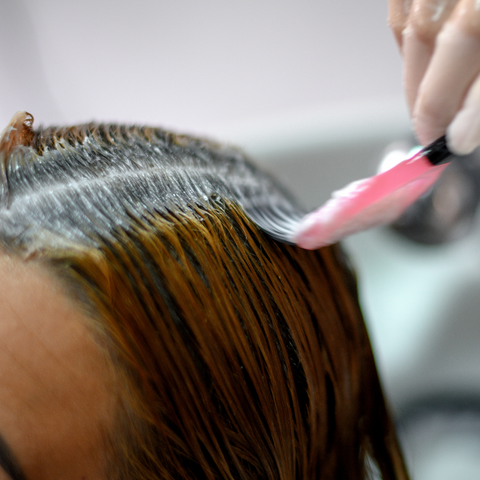
Sensitive Skin: Skincare Products
Share
Welcome back to the blog!
Last week we discussed how stress can affect your skin. Stress can cause acne, make skin problems worse and even prolong your skins ability to heal itself. If you haven't had a chance to read it, you can check it out here.
This week we're finishing out the sensitive skin series with discussing how skincare products affects your skin.
Now there has been a lot of chatter about how products affects your skin making it sensitive. From fragrances, colorants and ingredients; skincare products has gotten a bad rap. So let's discuss how the above plays a role in making your skin sensitive.

FRAGRANCES and DYES
Some of the most common skin irritants in cosmetics are fragrances and dyes. Many skin and hair care products contain chemical substances that can cause irritation and inflammation. With repeated exposure to these harmful substances, a number of reactions can occur such as rashes, swelling, clogged pores, and more. For example, eczema, a group of conditions that cause dermatitis (skin inflammation), can flare up from exposure to various skin irritants. These chemicals can irritate any skin type, but are particularly irritating to those with sensitive skin (caused by something else) or who are prone to eczema flare ups.

INGREDIENTS
When it comes to ingredients, its hard to pinpoint what doesn't work for our skin. And just because something doesn't work for our skin, doesn't necessarily mean that its a bad product, your skin doesn't mesh well with the product. Even natural ingredients can disagree with you.
- SD Alcohol (also known as denatured alcohol)
- Ammonia
- Arnica
- Balm mint
- Balsam
- Benzalkonium chloride
- Bergamot
- Camphor
- Cinnamon
- Citrus juices and oils
- Clove
- Clover blossom
- Coriander
- Essential oils
- Ethanol
- Eucalyptus
- Eugenol
- Fennel
- Fennel oil
- Fir needle
- Fragrance
- Geranium
- Grapefruit
- Horsetail
- Isoeugenol
- Lavender
- Lemon
- Lemongrass
- Lime
- Linalool
- Marjoram
- Melissa (lemon balm)
- Menthol
- Menthoxypropanediol
- Menthyl Acetate
- Mint
- Oak bark
- Orange
- Papaya
- Peppermint
- Phenol
- Sandalwood oil
- Sodium C14-16 olefin sulfate
- Sodium lauryl sulfate
- TEA-lauryl sulfate
- Thyme
- Wintergreen
- Witch hazel
- Ylang-ylang
FREE EBOOK!
5 Tips to Keep Your Skin Moisturized!
ACNE
Acne is a skin condition that results when follicles of the skin are clogged with dead skin cells and oil. These clogged areas can become infected with bacteria, swell, and lead to pimples. Many common skincare products contain ingredients that can make acne worse or cause it by promoting clogged pores. A study was reported about skin comedones in women after receiving skin beauty treatments One example of a comedogenic (clogs pores) ingredient is stearic acid.

What can you do?
In addition to avoiding products that can cause inflammatory responses, nightly cleansing of the skin with non-irritating and non-comedogenic products is an excellent way to help achieve healthier, clearer, and hydrated skin and prevent dermatitis and clogged pores due to exposure to irritating substances (use the list above as a guide).
Skin cleansers, moisturizes, and other skin cosmetics are available that contain these types of alternative healthier ingredients. Learning more about and being aware of the ingredients in common skincare products and opting for organic alternatives is a positive step toward healthier vibrant skin.
So the next time you purchase any products and have a negative reaction to it, it just means it doesn't work for you. It's all trial and error that should be taken seriously and with intention. This way you will be giving your skin the very best products to look its best!
I hope you enjoyed this series and received value from it. Stay tuned as next month we'll be discussing summer skin and hair care so you will be summertime fine! That blog will start on Monday, June 6. There will not be a blog on Monday, May 30 due to the holiday.
Until next time!
Beauty Mixtress™


4 comments
@Charles, this list is extensive. I believe these ingredients are found in a lot of everyday products. As a rule of thumb, stay away from products that lists any of these ingredients as the first or second ingredient in their formulation.
That’s a huge list to stay away from if you’re sensitive. Wow. Even things that normally are supposed to help. Thanks luv 😽
@Shirley, You’re very welcome and that’s very true. It’s helpful to know which known irritants to look out for. I used to think whatever didn’t work for me was just a bad product. But that’s not the case. Our skin just doesn’t agree with some ingredients, whether they’re on the no no list or not. For example, some individuals don’t like coconut oil. It’s natural but doesn’t agree with everyone’s skin.
Thank you for the helpful information. Sometimes when purchasing skincare products we forget to read the label for skin irritants.